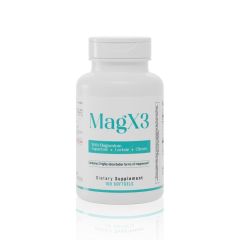The Ultimate Magnesium Guide
- Home
- Nutra Blog: Health and Nutrition
- The Ultimate Magnesium Guide

The Ultimate Magnesium Guide
Jul 5, 2025
By
Nutra Llc
0 comment(s)
Magnesium is an essential mineral for your body. It plays a key role in muscle function, heart health, energy production, stress relief, sleep quality, and bone strength. However, studies show that nearly half of adults in the United States do not get enough magnesium from their diet.
With so many magnesium supplements available, choosing the right one can feel confusing. This guide will help you understand the primary types of magnesium and how to choose the best option for your specific health goals.
1.Why Magnesium Matters
Magnesium is involved in over 300 biochemical reactions in the body. It helps regulate nerve and muscle function, supports a steady heartbeat, strengthens bones, and even helps convert food into energy. Low magnesium levels have been linked to fatigue, muscle cramps, anxiety, sleep problems, and more.
2.The Main Types of Magnesium Supplements
Magnesium Citrate
Magnesium citrate is magnesium combined with citric acid. It is highly absorbable and commonly used to raise magnesium levels in the body.
Best for: Supporting digestion, relieving occasional constipation, and boosting overall magnesium levels.
Considerations: Higher doses may cause loose stools, so it's best to start with a small amount if you have a sensitive stomach.
Magnesium Glycinate
This form combines magnesium with glycine, an amino acid known for its calming properties. Magnesium glycinate is well absorbed and gentle on the stomach.
Best for: Reducing anxiety, improving sleep quality, easing muscle tension, and supporting recovery after exercise.
Considerations: Typically very well tolerated, with minimal digestive side effects.
Magnesium Oxide
Magnesium oxide is one of the most common and affordable forms of magnesium. It contains a high amount of elemental magnesium, but is poorly absorbed by the body.
Best for: Occasional constipation or indigestion relief.
Considerations: Not ideal for correcting magnesium deficiency because of its low absorption. It can cause diarrhea.
Magnesium Malate
This form combines magnesium with malic acid, which plays a role in energy production. Magnesium malate is well absorbed and may help reduce muscle pain.
Best for: Supporting energy levels, easing muscle soreness, and helping with conditions like fibromyalgia.
Considerations: Generally well tolerated.
Magnesium Taurate
Magnesium taurate combines magnesium with the amino acid taurine. This combination is known for its heart-healthy benefits.
Best for: Supporting healthy blood pressure, heart function, and vascular health.
Considerations: A good option for those focusing on cardiovascular health.
Magnesium L-Threonate
Magnesium L-threonate is a newer form that can cross the blood-brain barrier, making it unique among magnesium supplements.
Best for: Supporting brain health, memory, and cognitive function.
Considerations: Often recommended for people looking to improve focus, mental clarity, or age-related cognitive decline.
Other Forms
Other forms of magnesium you might encounter include magnesium chloride, lactate, aspartate, and gluconate. These are generally better absorbed than magnesium oxide and can be helpful for daily supplementation.
Magnesium sulfate
(commonly known as Epsom salt) is typically used in baths for muscle relaxation and is not usually taken orally for magnesium supplementation.
How to Choose the Right Magnesium for You
Identify your health goal. Are you seeking better sleep, more energy, improved digestion, heart support, or cognitive benefits?
Match the type of magnesium to your needs. For example, choose magnesium glycinate for sleep, magnesium citrate for digestion, or magnesium taurate for heart health.
Start with a low dose. Aim for around 100-200 mg of elemental magnesium daily, and see how your body responds.
Quick Comparison Table
| Magnesium Form | Best For | Absorption |
| Citrate | Digestion, constipation, bone support | High |
| Glycinate | Sleep, relaxation, muscle recovery | Very high |
| Oxide | Constipation relief, antacid |
Low |
| Malate | Energy, muscle soreness | High |
| Taurate | Heart and blood pressure support | High |
| L-Threonate | Brain health, memory, cognition | Brain-specific |
| Chloride/Lactate/etc | General daily supplementation | Moderate-High |
| Sulfate | External use (baths, muscle relaxation) | Topical only |
YOU MAY ALSO BE INTERESTED IN
*Disclaimer: Statements made, or products sold through this website, have not been evaluated by the United States Food and Drug Administration.
They are not intended to diagnose, treat, cure or prevent any disease.

